By the end of 2025, artificial intelligence (AI) is no longer a futuristic concept—it’s an everyday reality. From helping doctors diagnose illnesses to personalizing online shopping and even supporting financial decision-making, AI is now embedded in how we live and work. But as its influence grows, so does the concern about how this powerful technology is being used. This is where the role of an AI Ethics Officer becomes critical.
In this article, we’ll explore what an AI Ethics Officer does, why the role is essential in 2025, the core skills needed, and how this profession is shaping the future of responsible technology.
Why AI Ethics Is More Important Than Ever

As AI systems become more advanced and widespread, they also raise tough ethical questions. Unfortunately, in many cases, AI has outpaced regulation and guidelines. This gap has created a demand for professionals who can help navigate these issues responsibly.
Read more: How to Build a Personal Brand That Gets You Hired in 2025
Here are a few major concerns AI Ethics Officers work to solve:
1. Bias in AI Algorithms
AI systems learn from the data they’re given, so if that data is biased, the technology can reflect—and even worsen—those biases. This can result in unfair treatment in hiring, lending, law enforcement, and more.
2. Lack of Transparency
Many AI systems, especially those using deep learning, are “black boxes”—they give results without explaining how or why. This makes it hard to understand or challenge decisions made by machines.
3. Privacy Risks
Artificial intelligence typically depends on large volumes of personal data to function effectively. Without proper oversight, this raises major issues about surveillance, consent, and data misuse.
4. Job Displacement
As AI automates more tasks, many people are worried about losing their jobs. Ethical discussions around AI must include plans for reskilling and creating new opportunities.
5. Accountability
When an AI system gets something wrong, who should be held accountable? The developer, the company, or the machine? These are complex issues that demand clear ethical policies.
For companies and governments aiming to use AI in a responsible way, these challenges cannot be ignored. This is exactly the kind of situation an AI Ethics Officer is there to handle.
What Does an AI Ethics Officer Do?

An AI Ethics Officer is responsible for making sure that an organization’s use of AI is aligned with ethical principles, laws, and social expectations. Their job goes far beyond compliance—it’s about guiding responsible innovation.
Here are the main responsibilities of an AI Ethics Officer in 2025:
1. Create Ethical Guidelines
They develop internal policies that define how AI should be used within the company. These guidelines are usually designed to promote fairness, protect privacy, ensure transparency, and hold organizations accountable.
2. Assess Ethical Risks
Before any AI system goes live, Ethics Officers perform a risk check. They look for bias in the data, analyze potential impacts, and review the system for transparency and fairness.
3. Ensure Legal Compliance
AI-related laws are evolving quickly. Officers keep up with regulations like the GDPR or the AI Act, and ensure their organization stays compliant.
4. Collaborate with Tech Teams
AI Ethics Officers work closely with engineers and developers to build systems that are interpretable and ethical from the start. They may recommend tools to reduce bias or improve transparency.
5. Champion Data Ethics
They play a key role in how data is collected, stored, and used—ensuring practices respect privacy and consent.
6. Lead Ethical Review Boards
Many companies now have ethics boards. AI Ethics Officers organize these and help guide decisions on high-risk AI projects.
7. Train Employees
They run workshops and create resources to help staff understand AI ethics and make better decisions in their daily work.
8. Engage with Stakeholders
Whether it’s users, regulators, or the media, Ethics Officers represent the company’s ethical stance and respond to concerns transparently.
9. Monitor AI Systems
Even after deployment, they continue to audit AI tools to catch new issues or unintended consequences.
Read more: Top 7 Industries Hiring the Most in 2025 (And How to Get a Job in Them)
What Skills and Qualifications Do You Need?
Becoming an AI Ethics Officer requires a rare mix of technical understanding, moral reasoning, and communication skills. Here’s what companies are looking for in 2025:
✅ Ethical Expertise
A solid understanding of ethical theory and practical principles is key. Many officers have a background in philosophy, sociology, or law.
✅ AI & Data Knowledge
You don’t have to be a coder, but having a solid grasp of how machine learning and algorithms function is important.
✅ Privacy and Regulation Awareness
Familiarity with laws like the California Consumer Privacy Act (CCPA), GDPR, and AI-specific policies helps navigate legal obligations.
✅ Problem-Solving and Critical Thinking
Analyzing complex, gray-area issues and finding practical solutions is a daily part of the job.
✅ Excellent Communication
AI Ethics Officers often explain ethical issues to developers, executives, and even the public. Clarity and empathy go a long way.
✅ Interdisciplinary Background
A background that blends technology and the humanities can give candidates a strong advantage. Common degree paths include computer science, public policy, business ethics, or human rights.
Why This Role Is Crucial in 2025
By 2025, businesses that overlook ethical issues face more than just negative publicity—they could suffer serious legal and financial consequences too. They risk legal trouble, damage to their reputation, and real-world harm to individuals. That’s why the AI Ethics Officer is not just a “nice to have”—it’s a business-critical role.
Here’s why this job matters now more than ever:
🔹 Builds Public Trust
When users know that a company is thinking carefully about the impact of its AI tools, they’re more likely to trust and support the brand.
🔹 Prevents Legal Issues
Being proactive about ethics helps companies avoid lawsuits, fines, and compliance failures.
🔹 Drives Responsible Innovation
Ethical AI design isn’t about slowing progress—it’s about building smarter, safer, and more sustainable systems.
🔹 Boosts Employee Morale
Many workers, especially younger generations, want to work for companies that reflect their values. Ethical leadership helps attract and retain talent.
🔹 Protects the Future
AI will shape the next century. Making sure it’s fair and inclusive is one of the biggest responsibilities of our time—and AI Ethics Officers are at the front line of that mission.
Conclusion
Artificial intelligence is transforming every part of modern life—and with that transformation comes responsibility. The AI Ethics Officer is a vital new role that ensures companies are using AI not just for profit, but for good.
By setting ethical policies, educating teams, reducing bias, and protecting user rights, these professionals help shape a future where AI works for everyone. Whether you’re an organization seeking to deploy AI responsibly or a professional interested in this new and meaningful career path, now is the time to take AI ethics seriously.


